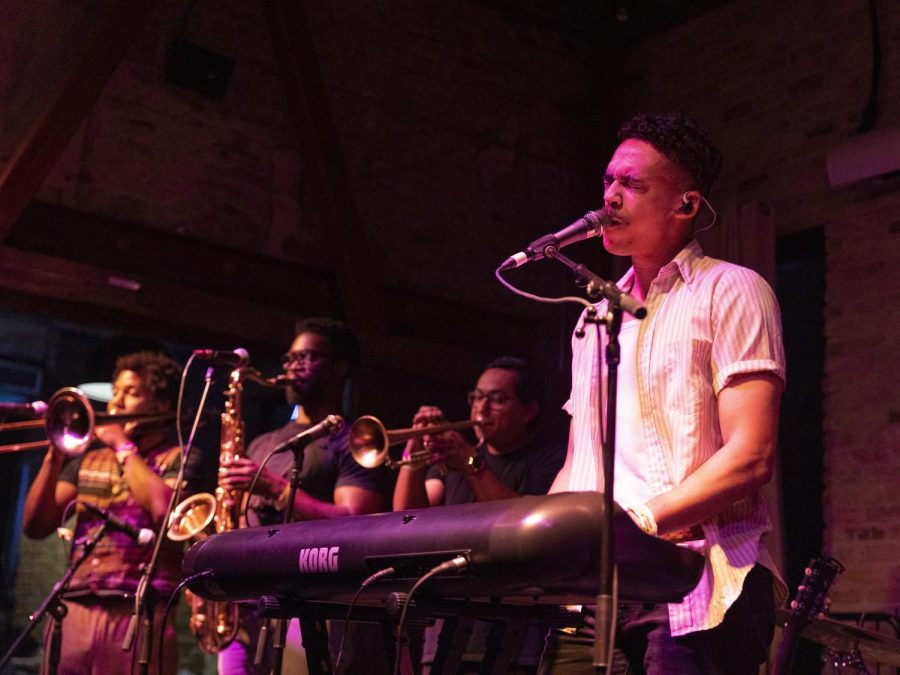Micah Edwards talks writing debut album Jean Leon, eternal relationship with music
March 16, 2023
Houston-based singer-songwriter Micah Edwards embellishes his twangy retro-soul and country-fused stories with smooth, buttery vocals. His 10-track LP Jean Leon draws upon various themes from love to brokenness and reconciliation.
The Daily Texan sat down with Edwards ahead of his South by Southwest set to discuss his Texas soul sound and musical influences.
The Daily Texan: You’ve explored a multitude of genres. How did you find your “Texas soul” sound?
Micah Edwards: My first songs I released were in that vein of John Mayer, Bruno Major, and they’ve already done that (kind of music) and done it well. I wanted to do something specific to my tastes and passion, which was jazz, soul (and) country music. I’ve always wanted to hear a sax solo behind a steel pedal. I thought, “Why not make it happen?”
DT: How did you get into doing music as a career? Why’d you think it was the path for you?
ME: I got a 9-to-5 job right out of college, but I was still (playing live music) at restaurants and weddings. I was always doing music as a side hustle, and then, I just had this cinematic moment in my office chair. I was like, “OK, I’m 23 years old. I don’t want to be doing this for the next 20 years without pursuing music and giving it a shot.”
DT: Your debut album talks about a spectrum of topics. How did creating this album help you reconcile with human relationships and past life events?
ME: The writing of that album was really therapeutic. I wasn’t one to tap into why I was reacting to certain things. My wife has helped a lot with that, but music helped a lot with that too. I didn’t have a choice. I realized I believed a lot of lies about myself, about what kind of husband and father I would be, but through my faith in Jesus, my parents’ ending doesn’t have to be my story with my wife.
DT: How does your background influence the songs you make?
ME: I grew up in Santa Barbara until I was 8 years old. … All my dad listened to was smooth jazz, and I thought smooth jazz was the only genre of music ever, which was funny for a 6-year-old to think. There’s West Coast jazz, (and) my parents love ‘70s music. Most of the great music of the ‘70s came out of California and England. Those are my first loves. When I moved to Texas, people introduced me to George Strait. There’s a radio station in Houston (called) 97.1FM Country Legends that I listened to all the time. Being rooted in soul and jazz in the ‘70s and then being introduced later to the country — you can hear that all over my music.
DT: How would you describe your relationship with music now?
ME: It’s a part of me. Even if I stopped pursuing this recording artist thing, I don’t think I’ll ever stop writing songs, record digging. … Jean Leon was the first time I used music to heal. I found out that connecting with music was a way I can be more self-aware and tap into my emotions. My wife and I recently went through a tragedy, and I wrote a song about it last week. It’s getting your mind around how you’re feeling, where you’re going and how you’re going to get there.
DT: What’s the most important lesson you’ve learned from making your album Jean Leon?
ME: Trusting the process, not rushing it and not being discontented. I still tell myself on a daily basis as an independent artist (that) it’s easy to get caught up and be like, “I wish I was at that festival,” but that album taught me to just do your best. Be passionate about what you’re doing in the moment. That can transfer to literally everybody, not just musicians.



